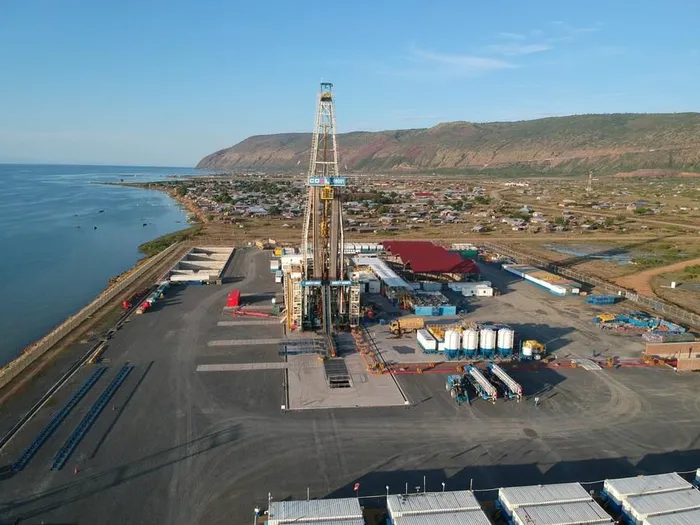Africa’s increasing role in global liquids storage

The aerial photo, taken on April 1, 2024, shows the Kingfisher Oil Field run by China National Offshore Oil Corporation (CNOOC) in Kikube, Uganda.
Image: XINHUA
A silent but significant change is occurring in Africa's oil and gas logistics sector. By 2030, the continent is expected to contribute approximately 12% of the world's new liquid storage capacity. This expansion is fueled by several factors: a fast-growing population, increasing industrialisation, and a corresponding rise in the consumption of both refined petroleum products and chemicals.
This capacity growth transcends mere fulfillment of domestic requirements, indicating a more profound transformation. Nations are strategically investing not only to safeguard their own supply chains but also to establish themselves as key regional export centers and to stabilise supply amid global oil-market fluctuations. Consequently, storage facilities emerge as a strategic asset, crucial for enhancing resilience, facilitating trade, and driving economic development.
Drivers: Demand, exports and energy security
Several key fundamentals drive the expansion of Africa's storage infrastructure. Firstly, the combination of population growth and increasing urbanisation fuels a greater demand for mobility fuels, heating oils, and chemicals used in industry. Furthermore, as logistics, manufacturing, and general infrastructure develop, there is a corresponding need for reliable supply chains, which, in turn, necessitates robust storage capacity.
African nations are increasingly developing downstream and midstream infrastructure, shifting their role from mere resource exporters. Storage terminals are key to this, facilitating the management of feedstock imports, refined products, chemical integration opportunities, and export logistics. Furthermore, storage facilities serve as a critical hedge against global supply disruptions. Maintaining large buffer-stocks reduces national vulnerability to sudden supply shocks, volatile price spikes, or logistical interruptions.
Uganda at the Forefront
Uganda is rapidly becoming East Africa's leader in planned liquid storage capacity, surpassing many traditional producers, according to data from GlobalData and industry analysts. This indicates the country's emerging dominance in continent-wide infrastructure power.
Uganda is spearheading a flagship project, a proposed terminal situated near Buloba in the Wakiso district, west of Kampala. This development is crucial for Uganda's oil-and-gas aspirations in the Albertine region, as the terminal, with an estimated capacity of approximately 25.2 million barrels (mbbl), will allow for the storage of refined petroleum products.
The Buloba terminal's clear strategic importance lies in its ability to ensure a consistent supply of liquids to the rapidly expanding Kampala market and other major consumption areas. Crucially, its development supports Uganda's future energy goals, including domestic refining, managing export logistics, or serving as feedstock storage as upstream oil and gas production begins. The project is being developed with the Uganda National Oil Company (UNOC) holding a significant 51% equity stake, thereby aligning national economic interests directly with the creation of this vital infrastructure.
Nigeria: Catching Up with Domestic and Export Ambitions
Despite Uganda's rapid growth in the liquids storage sector, Nigeria continues to be a significant market with ambitious storage expansion plans. A notable example is the Lagos terminal expansion, which is projected to boost capacity by approximately 6.3 million barrels (mbbl) by the year 2030.
The expansion of liquid storage infrastructure in Nigeria, particularly the Dangote Oil Refinery's wholly-owned and operated terminal, signifies a strategic push toward greater domestic crude processing and reduced dependence on imported refined products. This development, alongside terminal expansions in locations like Lagos, Eghudu, Koko I, and Kula, aims to bolster logistics capacity, thereby positioning Nigeria as a key fuel-exporting hub. The effort reflects a broader strategy to integrate and enhance refining, petrochemicals, and logistics capabilities.
Ghana’s Ambitious Petroleum Hub Vision
Ghana is undertaking a major initiative to bolster its role in West Africa's energy sector. This is centered on the expansive Petroleum Hub project in the Jomoro district, Western Region, managed by the Petroleum Hub Development Corporation (PHDC). A core aspect of this ambitious project is the development of the Jomoro terminal, which will integrate significant storage capacity with new refining and petrochemical plant facilities.
The hub's new-build projects are projected to contribute approximately 19.4 million barrels (mbbl) of additional storage capacity by 2030, though precise barrels-per-barrel figures vary across sources. Once fully developed, the total capacity of the hub's storage tanks is estimated to reach the equivalent of 10 million cubic meters (m³).
Ghana's Jomoro terminal is pivotal for its national supply security. More broadly, it underpins the country's strategic goal of becoming a key processing and export hub for refined products and chemicals throughout West Africa. By integrating storage capabilities with refining and petrochemical production, Ghana seeks to ascend the value chain.
Conclusion
Africa's liquid storage infrastructure is undergoing a significant transformation, positioning the continent for a heightened global role. By 2030, Africa is anticipated to contribute approximately 12% of worldwide capacity growth. Demonstrating this shift, key projects in Uganda, Nigeria, and Ghana exemplify the potential realised when strategic increases in demand, export aspirations, and security requirements converge. Storage is evolving from a mere technical asset to a core strategic component, central to how African nations will assess, govern, and leverage their petroleum resources in the forthcoming decade.
Sesona Mdlokovana
Associate at BRICS+ Consulting Group
African Specialist
** MORE ARTICLES ON OUR WEBSITE https://bricscg.com/
** Follow https://x.com/brics_daily on X/Twitter for daily BRICS+ updates
Related Topics: